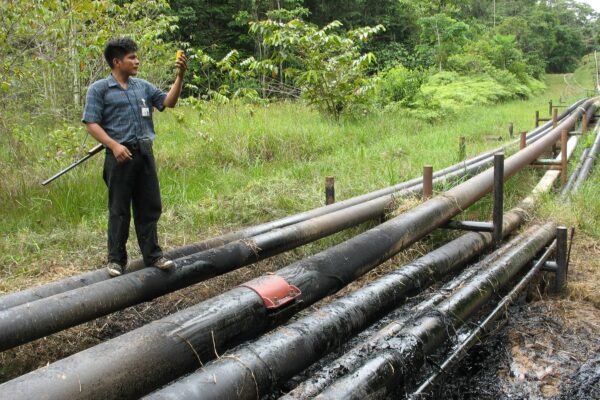Washington, DC – Human rights and environmental groups have warned oil conglomerate Perenco that its acquisition of Barrett Resources (Peru) LLC will bring the company substantial commercial and reputational risks.
With the takeover, Perenco has acquired hydrocarbon “rights” to a concession known as Block 67. The concession, located in the country’s north-western Marañon Basin, superimposes the proposed Napo-Tigre Territorial Reserve protected area for isolated indigenous groups.
In recent years, Peruvian and international groups have sounded the alarm about the presence of isolated peoples in this region, underlining that under international human rights law, the area should be off limits to the extractive industries in order to protect indigenous communities from epidemics and social dislocation.
AIDESEP, the national federation of Peru’s Amazonian indigenous organizations, has led the campaign to protect such isolated people. Studies presented by AIDESEP in 2005 concluded: “The zone … constitutes an area of traditional occupation of indigenous peoples in voluntary isolation, which use the existing natural resources through subsistence practices such as hunting, fishing, gathering, and farming.” Un-contacted indigenous groups inhabiting the area includeare the Taromenane, Arabela, Pananujuri, and Taushiri.
In the context of the country’s current “oil rush”, numerous organizations have protested the woefully inadequate the Environmental Impact Assessment process mandated by the Peruvian government for concessions that overlap isolated people’s territories, including Block 67.
“Barrett’s ‘contingency plans’, in the case their workers encountered isolated indigenous tribes, demonstrated a patent lack of understanding of the potentially fatal implications of their actions. At a minimum, Perenco must develop and demonstrate safeguards that would guarantee non-contact with any such groups,” said Save America’s Forests Matt Finer.
According to Perenco’s press release on their acquisition of Barrett: “Perenco brings to Peru extensive experience of working safely and with minimum impact in sensitive environments in Latin America and elsewhere. It is committed to minimize the environmental impact of its activities.” But Amazon Watch’s Andrew Miller warned: “This is a new paradigm for Perenco. ‘Social outreach’ to previously un-contacted indigenous people is tantamount to handing them a death sentence.”
AIDESEP is currently presenting a legal case against the Peruvian government’s approval of exploration and extraction projects in Blocks 39 and 67. Save America’s Forest’s Matt Finer emphasized: “The lawsuit isn’t just against the government, but also against Barrett and Repsol. So you could say Perenco actually just inherited a lawsuit directly against them.” Perenco should suspend operations, pending resolution of these cases, the two groups insisted.
Beyond potential threats to isolated people, extraction of heavy crude in Block 67 represents a risk to highly sensitive ecological areas, such as the Pucacuro Reserve. A planned pipeline will cut through the reserve, bisecting one of the most biologically significant and fragile regions of the Amazon basin.
Background: The potential for forced contact and conflict between oil workers and un-contacted people is rapidly increasing in Peru, as oil operations expand throughout the Amazon. AIDESEP, in conjunction with international legal experts, made multiple requests in 2007 for the immediate implementation of precautionary measures, to protect the lives and physical integrity of un-contacted groups in specific parts of the Peruvian rainforest.
In recent decades, forced contact of isolated groups in Peru has resulted in widespread deaths. The Yora de Kugapakori, of Madre de Dios province, were forcibly contacted in 1984 by illegal loggers utilizing roads created for Shell Oil’s operations. According to one estimate, more than 42% of the Yora population died from respiratory diseases for which they had no immunological defenses as a result.













